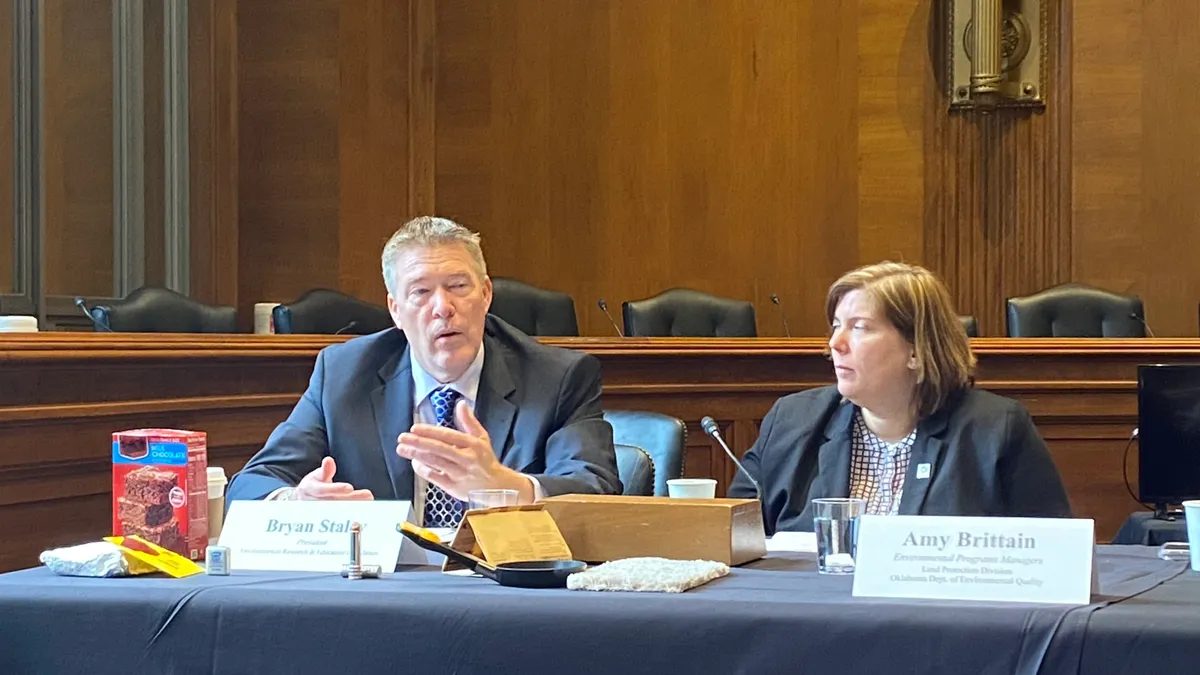WASHINGTON, DC: The waste industry asked Congress on Monday to intervene on a proposed Superfund update they say could have damaging effects on their ability to safely manage PFAS-containing materials and cost them millions.
At issue is the EPA’s proposed rule to designate two PFAS compounds as hazardous substances under the Comprehensive Environmental Response, Compensation and Liability Act, known as Superfund. It’s separate from another recent EPA proposal to set drinking water standards for six types of PFAS.
During a congressional briefing on Monday, landfill operators — along with composters, recyclers, water treatment plant operators and others who consider themselves “passive receivers” of PFAS-containing material — said the inclusion of the PFAS as hazardous under CERCLA could have costly unintended consequences. The National Waste & Recycling Association and the Solid Waste Association of North America hosted the briefing for aides from multiple congressional offices.
The designation of PFOS and PFOA as hazardous substances could mean such facilities would have to start rejecting PFAS-containing material, incur new costs for sorting or processing the material or face costly lawsuits related to the per-and polyfluoroalkyl substances, they said.
NWRA and SWANA have been asking Congress for a narrow CERCLA exemption for passive receivers since last year. The hearing on Monday was meant to draw more lawmakers’ attention to the issue and spur faster action, as the EPA doesn’t have regulatory authority to grant such an exemption, said Anne Germain, NWRA’s chief operations officer. “There has been a previous legislative exemption made for the oil and gas industry from CERCLA, so this is not unprecedented,” she said.
The groups say they support efforts to address PFAS contamination, but want to make sure CERCLA liability is focused on industries that are responsible for creating the pollution, such as chemical makers. During the hearing, groups said they worried about being hit with high costs for remediation of drinking water or transporting sewage sludge.
NWRA and SWANA have said estimated national costs to remove PFAS from landfill leachate could total at least $966 million per year, but operators could still be exposed to CERCLA liability if there are “trace concentrations.”
Facilities that handle biosolids and wastewater treatment plants that process PFAS are also concerned about potential logistics, said Delaware Solid Waste Authority CEO Rick Watson.
“The unknown is so overwhelming for us right now. It's tough for us to act and plan for the unknown,” he said. The authority has permits to accept biosolids at state landfills, and it discharges leachate to nearby wastewater treatment plants. Watson said a new hazardous waste designation for PFOS or PFOA could mean that material would need to be sent to a hazardous waste landfill instead. “We don't have the capacity in this country to receive all that material,” he said.
Composters are also facing tough choices, said Jeff Ziegenbein, president of the California-based Association of Compost Producers. California is in the thick of implementing universal organics recycling, and he said PFAS liability could cause capital investments and infrastructure planning to falter.
Composters could also face major issues with daily operations, Ziegenbein added. “It’s about avoiding liability, but for compost streams there’s no mitigation [for PFAS] that we know of,” he said. That could mean organic waste heads to landfills or becomes stranded in regulatory limbo.
Bryan Staley, president of the Environmental Research & Education Foundation, said research on PFAS in packaging shows human exposure to the chemicals is more likely to come from consuming the chemicals than coming in contact with them through wastewater or leachate. He advocated for the EPA to conduct more research on PFAS exposure pathways and focus its regulatory efforts on major PFAS producers.
Speakers said they’ve been in contact with EPA officials and understand CERCLA isn’t written to punish their industries for managing material. The EPA “gave us assurance they aren’t planning to go after us,” said Judy Sheahan, assistant executive director for the environment at the U.S. Conference of Mayors, which represents local government waste officials. However, that assurance doesn’t protect from third-party or citizen lawsuits, she said. The EPA recently hosted several listening sessions about its plans to establish a PFAS enforcement policy through CERCLA, noting that its intent was to focus enforcement on PFAS manufacturers and other industries that are responsible for “the release of significant amounts of PFAS into the environment.” That policy work is separate from the EPA’s draft rule regulating PFOS and PFOA as hazardous substances.














